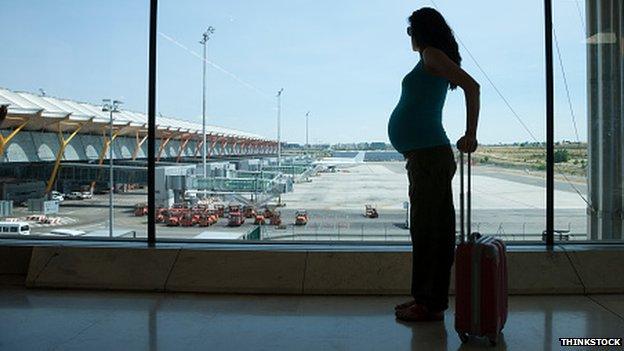Pregnant travellers offered new flight advice
- Published

Changes in air pressure and humidity on an aircraft do not have a harmful effect on pregnancy, the RCOG says
The safest time to fly during pregnancy is before 37 weeks or, if carrying twins, before 32 weeks, new advice says.
The Royal College of Obstetricians and Gynaecologists, external says flying is not harmful during a low-risk pregnancy, but there may be side-effects.
If more than 28 weeks pregnant, a woman should take her medical notes and a GP's letter.
Many airlines have their own rules on when pregnant women can fly.
Although everyone who flies is exposed to a slight increase in radiation, there is no evidence that flying causes miscarriage, early labour or a woman's waters to break.
Not harmful
The changes in air pressure and the decrease in humidity on an aircraft have not been shown to have a harmful effect on pregnancy either.
If the pregnancy is straightforward, flying is not harmful to the woman or her baby, the RCOG leaflet says.
Previously, the advice for women with multiple pregnancies was that the safest time to fly was before 34 weeks, but this has been changed to 32 weeks to tie in with International Air Transport Association (IATA) recommendations.
After 37 weeks, a woman may go into labour at any time.
The leaflet gives advice on the side-effects of flying when pregnant.
These include swelling of the legs due to a build-up of fluid, nose and ear problems caused by changes in air pressure and motion sickness making any pregnancy nausea a little bit worse.

Having regular drinks of water can help prevent against deep vein thrombosis
Long-haul flights of four hours or more can increase the risk of developing deep vein thrombosis (DVT), when a blood clot forms in the leg or pelvis, and pregnancy increases this risk even more.
The leaflet recommends that women wear loose clothing and comfortable shoes, take regular walks around the plane and do exercises in their seat every 30 minutes.
Cutting down on drinks containing alcohol or caffeine and wearing elastic compression stockings can also help.
No-fly zone
In some circumstances, however, it is better to take the decision not to fly when pregnant.
For example, if a woman has an increased risk of going into labour before her due date, has severe anaemia, sickle cell disease, has recently had significant vaginal bleeding or has a serious heart or lung condition.
Philippa Marsden, chairwoman of the RCOG's patient information committee, said the information was relevant for pregnant women travelling both short and long-haul.
"To help decide whether or not to fly, women should think about how many weeks pregnant they will be, what facilities are available at their destination and whether it will increase their risk of medical problems.
"It is important to discuss any health issues or pregnancy complications with your midwife or doctor before you fly."
Cath Broderick, chairwoman of the RCOG women's network, said the guidance offered sensible recommendations.
"There is new advice around what to take on board the flight such as your pregnancy notes, documents confirming your due dates, a European Health Insurance card and any medication you are taking."